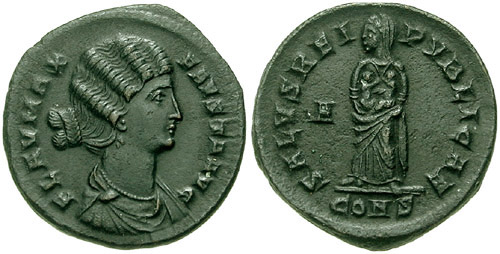Constantine, without a doubt in my humble opinion, was a very strange man. Don’t get me wrong, he was an extremely able and talented soldier, administrator, and emperor. But for all his achievements- whether political and religious, his completion of Diocletician’s military and legal reforms, his grand building projects or his victories over the Germans, Sarmatians, Goths and Dacians and the recapture of lost territory- he was ultimately a man of contradictions.
He came to power on the back of his army, who hailed him Augustus at York in 306. Later, he defeated Licinius at the Battle of Chrysopolis and upon becoming sole ruler of the Roman empire, through sheer force of will he began converting the empire’s populous to Christianity. Nothing it seemed was going to stand in his way of achieving his goals.
Although he was not completely void of tolerance and patience, he was on many occasions ruthless, vindictive and brutal when it came to anyone who stood in his way. As Emperor he thought that he had the right or license to deal with and eliminate anyone he liked. No one it seemed was exempt from his jealousy and rage, not even his friends, advisors or imperial rivals. He famously had his colleague Licinius executed and his family butchered, as an example of, what he was prepared to do to become sole emperor. However, there was one more crime, far greater than all those put together, that would haunt him for the rest of his life. On his orders, he had murdered, his own son Crispus and his wife Fausta. This most shocking act alone put a stain upon his reputation as the ‘first Christian emperor’.

Constantine’s eldest son Crispus. Caesar 316-26 AD. Circa 323 AD.
The story and events that led to their execution are unclear and sketchy at best. There are a few good theories that seem to float around, as to what might have happened. It is said that along the long road to Rome, where Constantine had planned on duplicating his celebrations of his 20th year in power for the people of Rome, (Rome had been offended that he chose to hold his vicennalia at Nicaea.) Constantine and a small contingent of his family reached Sirmium in early 326. It was there that Crispus was arrested and taken to Pola (Pula) and executed. Shortly afterwards, Fausta met the same fate as Crispus in a hot bath house, where she was either scolded, suffocated or stabbed to death.
Why did this all happen? One theory tells us that Constantine, in a fit of rage and jealousy over his son’s growing popularity, simply did it to get rid of Crispus, because he saw him as a potential rival. It is presumed that Constantine may have got wind of wild rumours of Crispus plotting to overthrow him, which were probably fanned by the jealousy of Fausta (Constantine’s second wife). Her motives may have been simple enough, to get rid of her adoptive son (Crispus) in favour of securing the succession of her three boys, Constantius, Constantine II and Constans, to rule. Though this act alone doesn’t account of why Fausta was murdered too.
Helena, Constantine’s mother, who held a grudge against Fausta, because of her influence over her son (Constantine), may have discovered the lies and treachery of her daughter-in-law and her role in the death of her beloved grandson and told Constantine of her findings. Therefore, Constantine in his remorse, for killing his own son, acted swiftly by killing Fausta?

Augusta Fausta and on the reverse she is holding her sons Constantine II and Constantius. Circa 326AD.
Other theories have Constantine killing both Crispus and Fausta because of an alleged adulterous affair between the two. Did Constantine discover the affair himself or did Fausta concoct a preposterous story to Constantine how Crispus tried to seduce her? In the end we will never know what really happened. The only real evidence that seems to ring true is that both Fausta and Crispus were both murdered. (Interestingly their names were so damned, that there is no reliable records of their deaths.) In death, both Crispus and Fausta also suffered the indignity of having their names removed from inscriptions across the empire.
Was Constantine for all his ‘greatness’ simply a troubled man? Surely he must have felt deep sorrow and regret for what he had done? Unfortunately, there is no record of any attempt by Constantine to redeem Crispus’ memory. Though, maybe he did try to atone for his crime in other ways? It cannot just be a coincident that following the death of both Crispus and Fausta, that Constantine went on an audacious Church building programme across the Empire? He personally also sent his mother Helena to the holy lands on a pilgrimage. Was he trying to buy his redemption? Maybe. After all he had succeeded in becoming, long after his death, a saint and a very important figure in Christian history, especially in the Eastern Church. The equal to the Apostles, in fact.
It’s human nature to try to resolve the contradictions of a person, especially if those contradictions go to extremes. I find myself resorting to the “flip sides of the same coin” mechanism to do this. For instance, “forceful and brave” can be the flip side of “brutal.” The largest figures in history often seem to have these contrasting aspects, and I tend to look for the explanation within the person’s character rather than searching for circumstantial explanations.